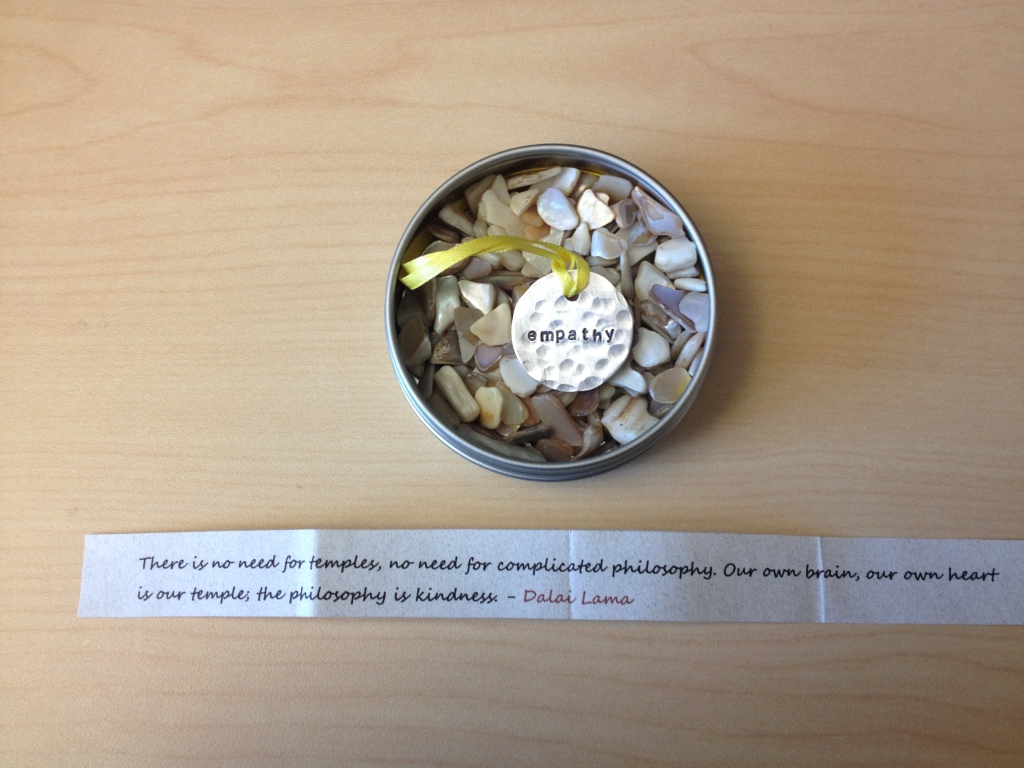In December, a friend and colleague of mine retired. Before she left our center, however, she gifted each of us with a lovely homemade present. In a little tin, nestled amongst multi-colored pebbles, was a metal circle etched with a word specially chosen for each of us. My friend picked out a word that she felt had meaning for us and in addition to the charm was a quote that gave additional context and meaning.
The word chosen for me was “empathy” and the quote that went along with the word: “There is no need for temples, no need for complicated philosophy. Our own brain, our own heart, is our temple, the philosophy is kindness.” — Dalai Lama
How strikingly simple and beautiful.
What a way to think about the new year.
I don’t do resolutions, but I do have goals and this year is no different. Of course I’d like to be more healthy and eat better, and exercise more, and get better sleep and write more productively and manage my time better. But these are aspirations that won’t make or break me – the kind of baby step improvements that for me would be nice but are not critical as I try to be mindful of these things anyway.
For the past several years I’ve gone the “word for the year” route. Many others do this as well. What I like about choosing a word for the year is that it helps me focus on my inner state – it’s more of an exercise for mindfulness if you will. In general, the word I choose provides a framework for how I make decisions in my life. The word I choose should fit into this sentence: “Am I doing this [choice, activity, task, project] with __________?” If, in fact, I am/was not doing said choice, activity, task, or project with _________ then I was prompted to reconsider if it was worth participating in that choice, activity, task or project.
Past words have included: intention, compassion, and integrity.
It is with gratitude for my friend and former colleague that I’ve chosen empathy as my word for 2014.
Empathy is a core skill that the social work profession, and social workers themselves, must have. Unfortunately I know far too many people who are more skilled in sympathy than empathy. There is no room in social work for sympathy. Sympathy is pity; it’s feeling sorry for someone else and trying to “help” them stop having those feelings. Empathy is not about feeling sorry for someone but being willing to try to understand what that person is going through — walking in someone else’s shoes, not trying to eliminate the pain per se, but sitting with them as they work through the painful or difficult time or situation. It is difficult to have empathy, because other people’s pain is scary and difficult – we often want to “fix it” out of them. And, sometimes people behave in ways that can be hurtful to others. In addition, if we are only capable of sympathy, it’s hard to deal with anger and depression and other such behaviors. We see those behaviors as being about us – we get offended, we feel victimized by other people’s actions and feelings toward us. Empathy allows us to look at the person underneath those behaviors, recognize that it’s the pain talking, their trauma, or loss – not the person.
There is a time for fixing and there is a time to just be with someone and share in their grief or pain or difficulty. This year, I am going to try and remember to ask myself, “Am I doing this [choice, activity, task, project] with empathy?”




You must be logged in to post a comment.